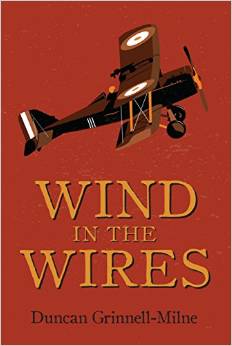The gathering pace of events surrounding the centenary of the Great War have coincided with some difficult times in my world and, as a consequence, I have found it very difficult finding the motivation to read barely any of associated books in my ‘to do’ pile. A slight change in the weather prompted me to pick up this reprinted classic and it proved to be an excellent choice.
Duncan Grinnell-Milne was just a teenager when he was commissioned into the Rifle Brigade in 1914, his youth barring him from service in the field when the war started. Our Duncan was determined to do something, so he jumped ship from the Black Buttoned Bastards to the Royal Fusiliers, who were far less squeamish about sending him overseas. He had by then become drawn to the allure of aviation and was sent to train as a pilot at Shoreham in Sussex where he developed affection for the Maurice Farman Longhorn he flew regularly. He received his wings in 1915 and was immediately sent to France and joined 16 Squadron, a recce/artillery spotting unit flying several aircraft, most predominantly the BE2c. The highlight of his time there came when he and his gunner shot down an Albatros C11.
After a number of scrapes our man force landed in German held territory and spent over two years in confinement before he managed to escape and return to flying duties in 1918 just as the German front was beginning to collapse. He went on to score five victories flying an SE5a with the elite 56 Squadron and finished the war with a tally of six. He stayed on in the new RAF and was still active during World War II but he was invalided out and went to work for the BBC before becoming an author. He died in 1973.
His memoir is typical of the time it was written. First published in 1937 this is a gentle look at the horrors of air fighting during the Great War without need for drama, gore or anything bordering on hysteria. None of the principle characters he met, save HM King George V, are mentioned directly. Like other books of the era there was a self-censorship attitude to naming old comrades for a variety of reasons. A reference to an encounter with ‘Boom’ can only be Hugh Trenchard, the imposing figure who led the new RAF; one of the bomber prophets whose beliefs would have much influence on British air strategy at the time this book was first published. If you find yourself on the Thames Embankment you will find his statue glaring at the world close to the air forces memorial.
This is a measured almost dreamy account of the author’s wartime service. Like so many other books of the era you can get a solid feel for what is left out as much as you do for the story the author chooses to share. There is an almost wistful feel to it, the author’s retelling of his very dangerous war is dripping with a brand of laissez faire we don’t go in for these days and he almost seems embarrassed to admit to shooting down enemy aircraft or doing very much at all. The entire saga of his time as a POW and his escape is covered in a separate work and there is a further volume on his flying days in addition to a range of history books he produced in later life.
These “old” first-hand accounts are generally immensely entertaining and are always authentic. Duncan Grinnell-Milne is part of a cluster of witty and clever writers who swapped sword for pen and produced thoroughly convincing accounts of their wartime experiences. A good many have been rehashed and “updated” and while they are still educational, they lack the solid authenticity of books such as this one. Wind in the Wires is rightly considered to be a classic of the genre and I don’t have any qualms in recommending it. The author finished his war service the recipient of the Military Cross and two Distinguished Flying Crosses. Despite his self-deprecating memoir going to great lengths to lessen his profile he was the real deal pure and simple.
You cannot help but enjoy these quiet gems and the less they are tinkered with the better. Grub Street appears to be on the case and hopefully we will see more of these superbly authentic memoirs of brave men from another age.
Reviewed by Mark Barnes for War History Online
WIND IN THE WIRES
By Duncan Grinnell-Milne
Grub Street
ISBN: 978-1-909808-01-0
